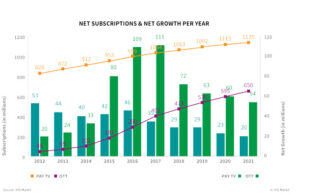China has overtaken the U.K. in the television programming industry, becoming the second-largest market in the world after the U.S., according to IHS Markit.
TV programming spend in China, including online platforms, reached 73 billion yuan ($10.9 billion) in 2017. The U.K. stood at $10 billion, while the U.S. led the global market, spending $58.3 billion.
“The growth in China’s TV programming spending is largely due to aggressive content investment by online companies Baidu, Alibaba and Tencent,” said Kia Ling Teoh, senior research analyst at IHS Markit. “These three giants have upped their spending on content origination and acquisition for their respective video platforms iQiyi, Youku Tudou and Tencent Video.”
Broadcaster ad-revenue growth in China has been relatively flat since 2014, reaching 83 billion yuan ($12.3 billion) in 2017, but online revenue is on the rise, led by greater video advertising and subscription income. TV broadcasters spent 43 billion yuan ($6.4 billion) on programming in 2017, compared to 30 billion yuan ($4.5 billion) spent by online platform companies.
“As digital entertainment viewership gains traction, advertisers are gradually moving more of their budgets to digital platforms,” Teoh said. “We expect online companies to overtake TV broadcaster spending in 2018, if the content creation spree persists.”
Original programming accounted for 49 percent of all Chinese programming in 2017, followed by acquired programming at 46 percent and sports programming at 5 percent. “Broadcasters and online platform companies are increasingly creating their own content, not only to lure paying subscribers but also for merchandising, mobile game development and other new revenue streams,” Teoh said. “In addition, distribution of linear TV and online platform content can generate lucrative returns, in both domestic and foreign markets.”
“While online platform companies are increasing China’s TV programming expenditure, they should be concerned by user retention and sustainability of content costs,” Teoh added. “In order to retain existing subscribers and attract new ones, online platform companies are investing heavily to create and acquire exclusive content. Unlike Netflix, these companies still rely substantially on advertising and sponsorship. If the cost of content continues to surge, such aggressive investment will become unsustainable.”


